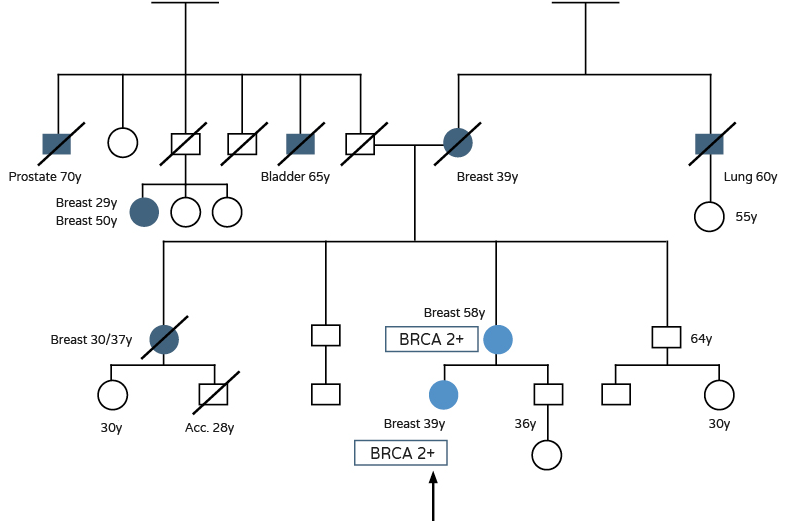Is there a history of cancer in your family?
Although most cancers are sporadic in origin, approximately 5 to 10% of cancers are considered hereditary.
At Dexeus Mujer, we have a Cancer Risk Unit with the professionals and means to assess the risk of you suffering from this type of cancer and to make the right decisions.
What is cancer risk prevention
At Dexeus Mujer, we offer the possibility of a visit to find out your family history, study the data and, if necessary, perform a genetic test with a blood sample.
The visit
First of all, we will conduct a thorough interview reconstructing your family tree. To do this, you will need to visit our Cancer Risk Unit and provide as much information as possible on the cases of cancer in your family:
- Type of cancer you and/or family members have had (preferably with all the medical information that you can provide).
- Age of onset of each cancer.
- In the event of the death of a family member, cause and age of death.
All these data will be studied by specialists and, if necessary, you will be offered blood chemistry tests to detect your risk. In this case, a small amount of blood will be sent to the reference laboratory, which will carry out the necessary tests.
You will then be informed personally of the results of the genetic tests and your risk of suffering a specific type of cancer.

Preventive strategy
If the studies indicate that you have a high cancer risk, a tailored preventive strategy will be drawn up for you by a multi-disciplinary committee of gynaecologists, gastroenterologists, geneticists, radiologists and psychologists. This preventive strategy could be based on three groups of action:
Early diagnosis
Means monitoring any possible sign of cancer. This includes the performance of gynaecological check-ups supplemented by a series of specific diagnostic procedures for cancer prevention, such as mammogram for control of the breasts and gynaecological ultrasound to examine the ovaries.
Medical treatment
Based on the administration of medicines to reduce the risk and therefore prevent the onset of cancer.
Surgery
Preventive surgery significantly reduces the risk of developing cancer, but does not exclude it 100%.
Genetic study
What are the advantages of undergoing a genetic study?
- Helps prevent, detect or treat cancer more effectively
- Eliminates the uncertainty surrounding cancer risk
- It may be useful for other members of your family at risk
- It lets each family member make the right decisions based on the result
- Only a blood sample is required
- Guarantees the total confidentiality of the results
Who could it interest
Cancer is a disease that is often not hereditary and the fact that there is a history of cancer in a family does not necessarily mean that its cause is hereditary.
However, we recommend a cancer risk prevention visit if one or more of the following applies to you:
CANCER RISK TEST
- You have three or more first-degree relatives (parents, children and siblings) or second-degree relatives (grandparents and uncles) diagnosed with cancer in the same organ.
- You have two or more first- or second-degree relatives diagnosed with cancer at a younger age than usual. For example, breast cancer before age 40, colon cancer before age 50 or prostate cancer before age 60.
- The cancer has bilaterally affected two of your relative's organs. For example, both breasts or both kidneys.
- You have a known family history of a related syndrome with a hereditary predisposition to cancer.
- You have a relative diagnosed with cancer in two different organs.
Why choose us
With 50 years of experience treating more than 30,000 patients, we have been endorsed as a leader in the fight against women's cancer.
Since the creation of our first Gynaecology, Oncology and Mastology committee in 1974, made up of specialists in gynaecology, oncology, radiology, pathological anatomy, radiotherapy and aesthetic surgery, we have worked with the goal of evaluating each patient's issue individually in order to establish a personalised and tailor-made treatment.
Our committee studies more than 1,200 cases a year, which are treated in one of Europe's largest private centres devoted exclusively to women.
We have the most advanced technology for the diagnosis and treatment of cancer, with state-of-the-art ultrasound machines and very low radiation mammography equipment which allows us to offer our patients reliable diagnoses from a very young age and without radiation risks, as well as laser and endoscopy equipment for the treatment of pre-invasive lesions.
In addition, our Clinical Genetics Unit can determine if you have a genetic risk of developing breast cancer. If so, we provide clinical monitoring even before it is diagnosed.
We have a dedicated cancer care service.








